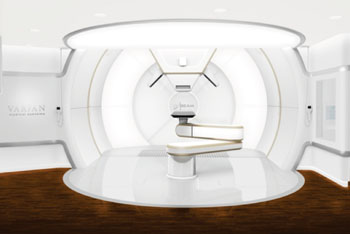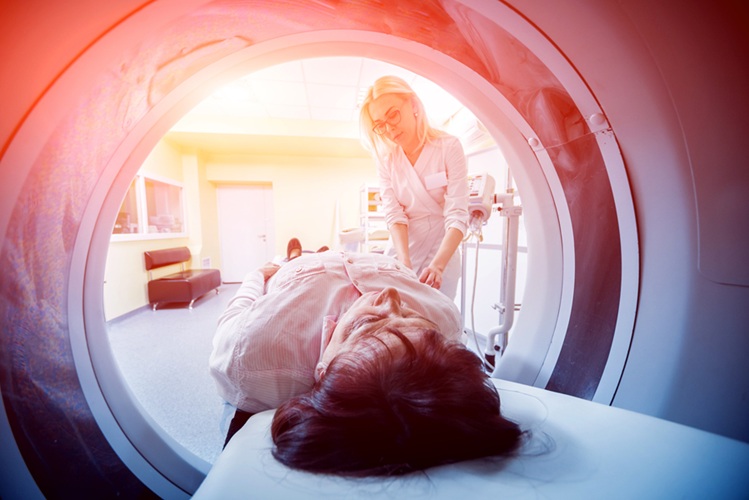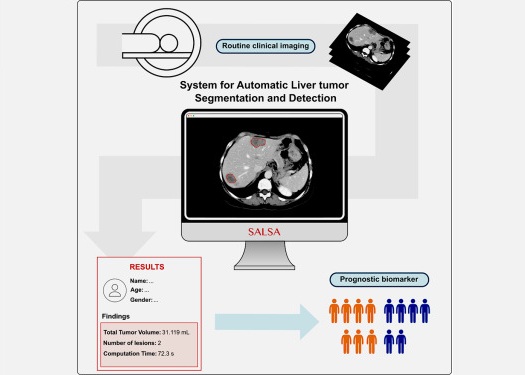Five Proton Therapy Treatment Rooms Plus System Upgrade Deployed at Scripps Proton Therapy Center
|
By MedImaging International staff writers Posted on 16 Oct 2014 |

Image: The ProBeam system treatment room (Photo courtesy of Varian Medical Systems).
An upgrade of a proton system will improve workflow at a US proton therapy center, enabling the use of the fixed-beam treatment rooms as well as more diverse patient-positioning devices. Moreover the new technology is designed to enhance the quality of images generated by the system’s integrated imager.
Varian Medical Systems (Palo Alto, CA, US) has completed commissioning of five treatment rooms at the Scripps Proton Therapy Center (San Diego, CA, USA) earlier in 2014, and has upgraded the ProBeam system software. “We anticipate that the upgrade to ProBeam 2.5 will, by improving our treatment workflow and making available our two fixed-beam rooms, substantially increase our ability to provide clinical services to a growing and diverse patient population,” said Carl Rossi, MD, medical director of the Scripps Proton Therapy Center. “We expect it will be a significant improvement in our facility’s capabilities and will be an example of the continued development and flexibility inherent in the ProBeam treatment system.”
“We were very pleased with the response of the Scripps clinical team when we turned over the fifth treatment room after commissioning,” said Dr. Moataz Karmalawy, general manager of Varian’s particle therapy division. “Those who had experience with the commissioning process at other centers using other systems told us that this was the fastest ramp-up they had seen.”
Varian is also pleased to announce that testing conducted recently at Scripps has demonstrated that the cone-beam CT system, currently used on all TrueBeam machines, is compatible with ProBeam technology. High-quality images have been generated using the system at Scripps, and this functionality will be made available to customers in 2015. High quality kV imaging is already in clinical use.
The ProBeam system, which will be on display at the meeting of the American Society for Radiation Oncology (ASTRO) held in San Francisco (CA, USA), in October 2014, incorporates Varian’s unique Dynamic Peak scanning technology for intensity-modulated proton therapy (IMPT), robotic patient positioning tools, and a comprehensive suite of motion management tools. It incorporates an integrated 2-D and 3-D imager for real-time image guidance, as well as the option of planning and managing treatments using Varian’s Eclipse and ARIA software systems.
Varian proton therapy technology is also in place at the Rinecker Proton Therapy Center in Munich (Germany) and the Paul Scherrer Institute in Switzerland. Varian has contracts to install ProBeam systems at seven additional centers at the University of Maryland in Baltimore; Emory University in Atlanta (GA, USA); Cincinnati Children’s Hospital in Ohio (USA); University of Texas Southwestern in Dallas (USA); KFMC-King Fahd Medical City in Saudi Arabia; PTC in St. Petersburg (Russia); and National Taiwan University in Taipei.
Related Links:
Varian Medical Systems
Scripps Proton Therapy Center
Varian Medical Systems (Palo Alto, CA, US) has completed commissioning of five treatment rooms at the Scripps Proton Therapy Center (San Diego, CA, USA) earlier in 2014, and has upgraded the ProBeam system software. “We anticipate that the upgrade to ProBeam 2.5 will, by improving our treatment workflow and making available our two fixed-beam rooms, substantially increase our ability to provide clinical services to a growing and diverse patient population,” said Carl Rossi, MD, medical director of the Scripps Proton Therapy Center. “We expect it will be a significant improvement in our facility’s capabilities and will be an example of the continued development and flexibility inherent in the ProBeam treatment system.”
“We were very pleased with the response of the Scripps clinical team when we turned over the fifth treatment room after commissioning,” said Dr. Moataz Karmalawy, general manager of Varian’s particle therapy division. “Those who had experience with the commissioning process at other centers using other systems told us that this was the fastest ramp-up they had seen.”
Varian is also pleased to announce that testing conducted recently at Scripps has demonstrated that the cone-beam CT system, currently used on all TrueBeam machines, is compatible with ProBeam technology. High-quality images have been generated using the system at Scripps, and this functionality will be made available to customers in 2015. High quality kV imaging is already in clinical use.
The ProBeam system, which will be on display at the meeting of the American Society for Radiation Oncology (ASTRO) held in San Francisco (CA, USA), in October 2014, incorporates Varian’s unique Dynamic Peak scanning technology for intensity-modulated proton therapy (IMPT), robotic patient positioning tools, and a comprehensive suite of motion management tools. It incorporates an integrated 2-D and 3-D imager for real-time image guidance, as well as the option of planning and managing treatments using Varian’s Eclipse and ARIA software systems.
Varian proton therapy technology is also in place at the Rinecker Proton Therapy Center in Munich (Germany) and the Paul Scherrer Institute in Switzerland. Varian has contracts to install ProBeam systems at seven additional centers at the University of Maryland in Baltimore; Emory University in Atlanta (GA, USA); Cincinnati Children’s Hospital in Ohio (USA); University of Texas Southwestern in Dallas (USA); KFMC-King Fahd Medical City in Saudi Arabia; PTC in St. Petersburg (Russia); and National Taiwan University in Taipei.
Related Links:
Varian Medical Systems
Scripps Proton Therapy Center
Latest Nuclear Medicine News
- Novel Radiolabeled Antibody Improves Diagnosis and Treatment of Solid Tumors
- Novel PET Imaging Approach Offers Never-Before-Seen View of Neuroinflammation
- Novel Radiotracer Identifies Biomarker for Triple-Negative Breast Cancer
- Innovative PET Imaging Technique to Help Diagnose Neurodegeneration
- New Molecular Imaging Test to Improve Lung Cancer Diagnosis
- Novel PET Technique Visualizes Spinal Cord Injuries to Predict Recovery
- Next-Gen Tau Radiotracers Outperform FDA-Approved Imaging Agents in Detecting Alzheimer’s
- Breakthrough Method Detects Inflammation in Body Using PET Imaging
- Advanced Imaging Reveals Hidden Metastases in High-Risk Prostate Cancer Patients
- Combining Advanced Imaging Technologies Offers Breakthrough in Glioblastoma Treatment
- New Molecular Imaging Agent Accurately Identifies Crucial Cancer Biomarker
- New Scans Light Up Aggressive Tumors for Better Treatment
- AI Stroke Brain Scan Readings Twice as Accurate as Current Method
- AI Analysis of PET/CT Images Predicts Side Effects of Immunotherapy in Lung Cancer
- New Imaging Agent to Drive Step-Change for Brain Cancer Imaging
- Portable PET Scanner to Detect Earliest Stages of Alzheimer’s Disease
Channels
Radiography
view channel
AI Improves Early Detection of Interval Breast Cancers
Interval breast cancers, which occur between routine screenings, are easier to treat when detected earlier. Early detection can reduce the need for aggressive treatments and improve the chances of better outcomes.... Read more
World's Largest Class Single Crystal Diamond Radiation Detector Opens New Possibilities for Diagnostic Imaging
Diamonds possess ideal physical properties for radiation detection, such as exceptional thermal and chemical stability along with a quick response time. Made of carbon with an atomic number of six, diamonds... Read moreMRI
view channel
Cutting-Edge MRI Technology to Revolutionize Diagnosis of Common Heart Problem
Aortic stenosis is a common and potentially life-threatening heart condition. It occurs when the aortic valve, which regulates blood flow from the heart to the rest of the body, becomes stiff and narrow.... Read more
New MRI Technique Reveals True Heart Age to Prevent Attacks and Strokes
Heart disease remains one of the leading causes of death worldwide. Individuals with conditions such as diabetes or obesity often experience accelerated aging of their hearts, sometimes by decades.... Read more
AI Tool Predicts Relapse of Pediatric Brain Cancer from Brain MRI Scans
Many pediatric gliomas are treatable with surgery alone, but relapses can be catastrophic. Predicting which patients are at risk for recurrence remains challenging, leading to frequent follow-ups with... Read more
AI Tool Tracks Effectiveness of Multiple Sclerosis Treatments Using Brain MRI Scans
Multiple sclerosis (MS) is a condition in which the immune system attacks the brain and spinal cord, leading to impairments in movement, sensation, and cognition. Magnetic Resonance Imaging (MRI) markers... Read moreUltrasound
view channel.jpeg)
AI-Powered Lung Ultrasound Outperforms Human Experts in Tuberculosis Diagnosis
Despite global declines in tuberculosis (TB) rates in previous years, the incidence of TB rose by 4.6% from 2020 to 2023. Early screening and rapid diagnosis are essential elements of the World Health... Read more
AI Identifies Heart Valve Disease from Common Imaging Test
Tricuspid regurgitation is a condition where the heart's tricuspid valve does not close completely during contraction, leading to backward blood flow, which can result in heart failure. A new artificial... Read moreGeneral/Advanced Imaging
view channel
CT-Based Deep Learning-Driven Tool to Enhance Liver Cancer Diagnosis
Medical imaging, such as computed tomography (CT) scans, plays a crucial role in oncology, offering essential data for cancer detection, treatment planning, and monitoring of response to therapies.... Read more
AI-Powered Imaging System Improves Lung Cancer Diagnosis
Given the need to detect lung cancer at earlier stages, there is an increasing need for a definitive diagnostic pathway for patients with suspicious pulmonary nodules. However, obtaining tissue samples... Read moreImaging IT
view channel
New Google Cloud Medical Imaging Suite Makes Imaging Healthcare Data More Accessible
Medical imaging is a critical tool used to diagnose patients, and there are billions of medical images scanned globally each year. Imaging data accounts for about 90% of all healthcare data1 and, until... Read more
Global AI in Medical Diagnostics Market to Be Driven by Demand for Image Recognition in Radiology
The global artificial intelligence (AI) in medical diagnostics market is expanding with early disease detection being one of its key applications and image recognition becoming a compelling consumer proposition... Read moreIndustry News
view channel
GE HealthCare and NVIDIA Collaboration to Reimagine Diagnostic Imaging
GE HealthCare (Chicago, IL, USA) has entered into a collaboration with NVIDIA (Santa Clara, CA, USA), expanding the existing relationship between the two companies to focus on pioneering innovation in... Read more
Patient-Specific 3D-Printed Phantoms Transform CT Imaging
New research has highlighted how anatomically precise, patient-specific 3D-printed phantoms are proving to be scalable, cost-effective, and efficient tools in the development of new CT scan algorithms... Read more
Siemens and Sectra Collaborate on Enhancing Radiology Workflows
Siemens Healthineers (Forchheim, Germany) and Sectra (Linköping, Sweden) have entered into a collaboration aimed at enhancing radiologists' diagnostic capabilities and, in turn, improving patient care... Read more



















